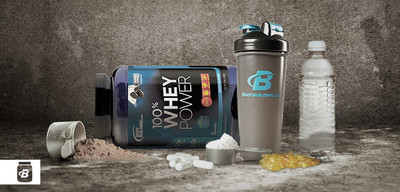Sleep, genetics, your training program, nutrition, and stress all play a role in how your body looks and how you feel. If you've reined in your diet and are doing tons of resistance training but you still can't seem to drop body fat, whey protein may help.
What is Whey Protein?
Whey protein is a milk protein that is the liquid byproduct of cheese production. In supplement form, whey protein comes in three main forms.
Whey Protein Concentrate
Whey protein concentrate contains anywhere between 29-89-percent protein depending on the specific product. It also has some fat and lactose. Concentrates often have more bioactive compounds than more refined forms of whey protein. That means they have more nutrients, but it also can make them harder to digest if you're sensitive to dairy.
Since whey protein concentrate is the most carb- and fat-rich type of whey protein, it's a little higher in calories than an isolate or hydrolysate. But, it's a good choice for a meal replacement when you want some of these other macros anyway. It's also the most affordable type of whey protein.
Whey Protein Isolate
Whey protein isolate has been filtered so it contains less fat, cholesterol, and lactose than whey protein concentrate, and 90 percent or more protein. Whey protein isolate is high-protein, fast-digesting, and versatile. You can shake it up with water when you need a quick protein source or blend it with other goodies to keep you full longer.
Whey Protein Hydrolysate
Whey protein hydrolysate is the most pure and refined type of whey protein. It's already partially broken down (pre-digested, in a sense) so it's easier to absorb. Hydrolysates are taken up quicker than both whey protein concentrate and whey protein isolate.
Some people who have trouble digesting isolates and concentrates do OK with hydrolysate protein powders. It's a little pricier than other whey protein options, but worth it for its fast action and digestibility.
How is Whey Protein Unique?
Whey protein has the highest possible protein digestibility corrected amino acid score (PDCAAS), a measure of both how well a protein is digested and how well it supplies the amino acids you need.[1] Compared to other sources of dietary protein, whey protein goes down easy and is taken up quickly.
In addition, whey protein is a complete protein, meaning it contains all the essential amino acids. Essential amino acids are aminos your body can't produce, that you have to get through food or supplements. Whey also contains more branched-chain amino acids (BCAAs) than any other source of protein, particularly leucine.
BCAAs
BCAAs are a group of three essential amino acids: leucine, valine, and isoleucine. These amino acids can increase muscle protein synthesis and give you energy for resistance exercise. Muscle protein synthesis is the body's process of creating new muscle mass.
You can get these important amino acids as supplements or from dietary protein. Since whey protein has a high concentration of branched-chain amino acids as well as being more quickly digested than other protein sources, it's one of the best places to get your BCAAs.
How Can Whey Protein Help You Lose Body Fat?
Consuming whey protein pre- or post-workout just might help you tip the scale in favor of muscle growth and strength gains over time. But this mainstay protein powder can help you lose fat, too.
Whey Protein Is Rich in Leucine
Leucine is an amino acid that plays a key role in muscle protein synthesis. Protein synthesis doesn't just build your muscles, the process also burns through quite a few calories. In addition, it stimulates fatty acid oxidation (i.e. fat burning).
Whey Satiates Your Appetite
Of all the macronutrients (carbs, fat, and protein), protein is best at making you feel satiated, or full. If you're cutting calories, choosing foods that are as satiating as possible will help make sticking to your diet less stressful.
Studies show that milk proteins such as whey may satiate your appetite better than some other protein sources.[2] But, having a high enough protein intake in general is the most important thing. Eat plenty of dietary protein from food sources like meat, eggs, and fish, and supplement with whey protein to max out your protein intake.
Protein is even more filling when paired with fiber. Make a meal replacement shake with whey protein powder, fruit, and some leafy greens to fill up on minimal calories.
Scientific Research on Whey
Whey protein supplementation has a lot of potential to help with weight loss, based on scientific research. For instance:
- In a placebo-controlled study on whey protein and dieting, one group of dieters was given a whey protein supplement, and the other group was given a placebo. The whey protein group lost more fat than the control group, and kept more muscle mass.[3]
- Another study in 2006 found that adding 60 grams of whey protein per day, in comparison to 60 grams of soy protein or 60 grams of carbohydrate, led to decreases in body fat and weight after 6 months.[4]
Lose Fat, Keep Your Gains
It's tough to diet for weight loss while keeping your hard-earned muscle mass. Whey protein is a crucial weapon in this struggle. As we've seen, the amino acids in whey protein support muscle protein synthesis. This doesn't only help you build new muscle, it also helps protect existing muscle.
During weight loss, when the body doesn't have as many calories available during and after resistance exercise, it can break down muscles to use as fuel. Drinking whey protein can help stop that from happening, because your body will metabolize these amino acids instead of the ones in your muscles.
Whey Protein Versus Casein
Like whey protein, casein is another type of milk protein that can help with protein synthesis and satiety. But, they're not interchangeable.
Whey protein is great before or after resistance training because it gives you a quick hit of amino acids. This is especially true of whey protein isolate or hydrolysate.
Casein protein is slower to digest than whey-based powders. It won't hit your muscles as quickly, but it gives you a steady supply of amino acids over several hours. It can be substituted for whey protein as a meal replacement or before bed, but whey protein is better for pre- or post-workout.
Additional Tips to Help Shed Body Fat
- Use a food journal and write down everything you eat. You'll be able to uncover habits you didn't realize were holding you back and find ways to improve.
- Contact a registered dietitian. These professionals have the education and experience to give you personalized advice and hone your nutrition plan.
- Check out our page to see what strategies others have used to successfully drop fat pounds.
If you've added whey protein and are doing everything else right but you're still struggling to lose weight, talk to your doctor. Low levels of certain hormones and other conditions can make weight loss more difficult.
Wrapping Up
If you want to shed body fat, whey protein can be a smart addition to your routine. Between its hunger-slaying and muscle-protecting abilities, it can give you a boost to keep your body composition heading in the right direction.
References
- Hoffman, J. R., & Falvo, M. J. (2004). Protein–which is best?Journal of Sports Science and Medicine, 3(3), 118.
- Luhovyy, B. L., Akhavan, T., & Anderson, G. H. (2007). Whey proteins in the regulation of food intake and satiety. Journal of the American College of Nutrition, 26(6), 704S-712S.
- Frestedt, J. L., Zenk, J. L., Kuskowski, M. A., Ward, L. S., & Bastian, E. D. (2008). A whey-protein supplement increases fat loss and spares lean muscle in obese subjects: a randomized human clinical study. Nutrition & Metabolism, 5(1), 8.
- Baer, D. J., Stote, K. S., Clevidence, B. A., Harris, G. K., Paul, D. R., & Rumpler, W. V. (2006). Whey protein decreases body weight and fat in supplemented overweight and obese adults. The FASEB Journal, 20(4), A427-A427.

